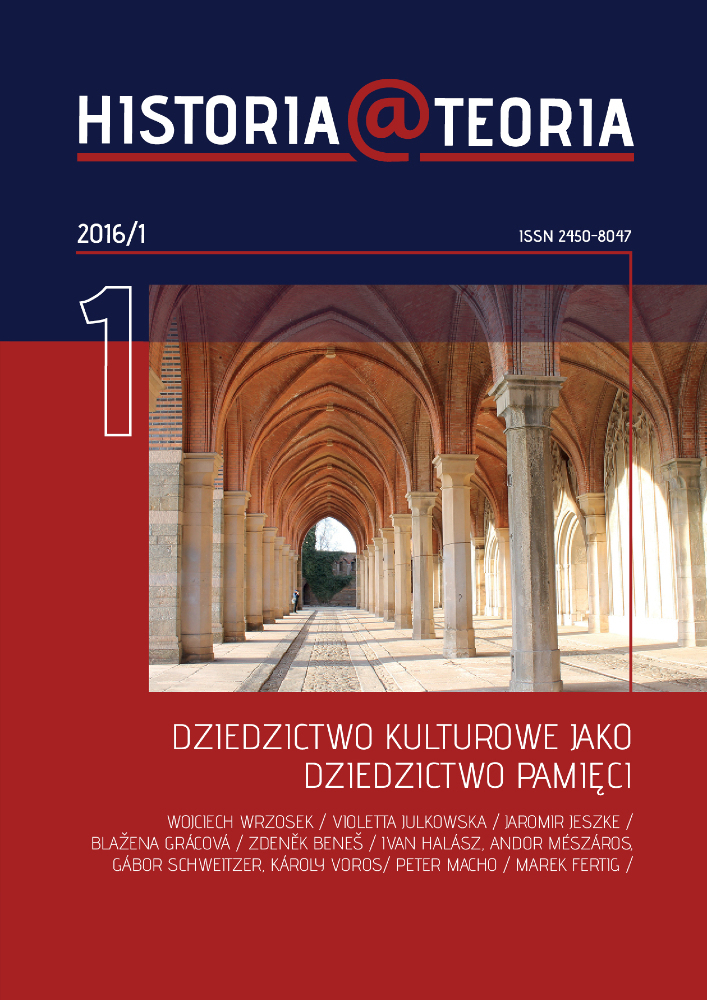Abstrakt
The present paper maps the portrayal of Andrej Hlinka within the Protestant milieu during his lifetime. It also tries to answer the question of Hlinka’s position in the hierarchy of symbols which were and are relevant for the formation of the Slovak Protestants’ identity. Nowadays, ambivalent or expressly negative att itudes towards Hlinka prevail within the Lutheran community, however, similar att itudes prevailed also during the interwar and aft er-war periods.
In 1902 at the regional forum, A. Hlinka did not support the rights of the Slovak language which represented a major att ribute of the national identity of Slovaks. Hlinka’s att itude was then reminded in the Lutheran milieu in the situations when an idealized and mythologized portrayal of Hlinka as an uncompromising fi ghter for the national rights spread in particular via offi cial propaganda. In fact, it served as a de-legitimizing instrument of Hlinka cult. During the existence of the Slovak State (1938/1939 – 1945) Slovak Protestants were massively confronted with the phenomenon of Hlinka and denied this historical fi gure in the position of the most signifi cant national symbol. At the religious celebration of the national hero General Milan Rastislav Štefánik in May 1939, General Bishop of the Protestant Church Vladimír Pavel Čobrda compared both personages – Hlinka and Štefánik – and refused the symbolic governmental policy and propaganda which tried to make believe the whole society including Lutherans that Hlinka was a positive social example. He called Štefánik the greatest Slovak who became the symbol of antifascist resistance.
Bibliografia
Baník A. A., O dialektickej podstate slovenského konfesionalizmu, Martin 2000.
Čaplovič M., “Tri dokumenty k slovensko-poľským vzťahom z jari 1938”, Historický časopis, 2000(48)/2.
Čobrda V. P., Reč povedaná na Bradle dňa 21. mája 1939, Myjava 1939.
Dokumenty slovenskej národnej identity a štátnosti II. Bratislava 1998, p. 150-152, dokument č. 202, Zvolenský manifest.
Ďuriška Z., Medzi mlynmi a bankami. Dejiny rodu Makovickovcov, Martin 2007.
Evanjelický posol spod Tatier, 2007(97)/41.
Holec R., Tragédia v Černovej a slovenská spoločnosť, Martin 1997.
Janoška J., Z domáceho odboja, [w:] Služba národu, ed. Osuský S. Š., Liptovský Sv. Mikuláš 1938.
Kirschbaum Jozef, Fuga František ed., Andrej Hlinka v slove a obraze. Zborník článkov a fotografi í, ktorý na uctenie Hlinkovej pamiatky do tlače začal zbierať Ján Mešťančík., Toronto-Ružomberok 1991.
Krivý V., Kolektívne identity na súčasnom Slovensku. Pramenná publikácia dát zo sociologického výskumu, Bratislava 2004.
Lutherans do not want Lex Hlinka. What is in the bill of SNS. [strona www]: http://www.sme.sk/c/3514405/evanjelici-nechculex-hlinka.html, dostęp: 26.08. 2014.
„Národnie noviny”, 1934(65)/90.
Neděle, 25. února 1934, „Radiojournal”, 1934(12)/8.
Rázus M., Príčiny rozchodu Ľudovej a Národnej strany, Slovák v Amerike, 1936(48)/34.
Roguľová J., Slovenská národná strana 1918-1938, Bratislava 2013.
Šenšel I., Pevný buď. Život a dielo seniora Ľudovíta Šenšela, Liptovský Mikuláš 1998.
Sidor K., Andrej Hlinka (1864-1926), Bratislava 1934.
Slovak National Library - Literary Archive, fond: Martin Rázus, sign. 45 E 45, [list] Andrej Mihal [do] Martin Rázus, 5 Oct 1932.
Slovak National Library - Literary Archive, fond: Martin Rázus, signatúra 45 D 11, [list:] Jur Janoška Jr [do] Martin Rázus.
Slovak National Library in Martin, Literary archive, fond: Darina Bancíková, škatuľa: 4, Práce vlastné, D. Bancíková, Okresné pobočky Konfederácie politických väzňov…, Nepovedaný príspevok na sneme KPVS v Bratislave, 1 June 1996.
Slovenčina v Liptove, „Národnie noviny”, 1902(33)/60.
Suško L., Evanjelická cirkev augsburského vyznania na Slovensku 1938/39 v zrkadle cirkevnej tlače, „Historický časopis”, 2001(49)/1.
Licencja
Autorzy
Autorzy tekstów przyjętych do publikacji w czasopiśmie Historia@Teoria są zobowiązani do wypełnienia, podpisania i odesłania na adres redakcji umowy o udzielenie nieodpłatnej licencji do utworów, z zobowiązaniem do udzielania sublicencji CC.
Zgodnie z umową, autorzy tekstów opublikowanych w czasopiśmie Historia@Teoria udzielają Uniwersytetowi im. Adama Mickiewicza w Poznaniu niewyłącznej i nieodpłatnej licencji oraz zezwalą na użycie sublicencji Creative Commons Attribution-NoDerivatives 4.0 International (CC BY-ND 4.0).
Autorzy zachowują prawa do dalszego, swobodnego rozporządzania utworem.
Użytkownicy
Zainteresowani użytkownicy internetu uprawnieni są do korzystania z utworów opublikowanych od 2015 roku w Historia@Teoria pod następującymi warunkami:
- uznanie autorstwa - obowiązek podania wraz z rozpowszechnionym utworem, informacji, o autorstwie, tytule, źródle (odnośniki do oryginalnego utworu, DOI) oraz samej licencji;
- bez tworzenia utworów zależnych - utwór musi być zachowany w oryginalnej postaci, nie można bez zgody twórcy rozpowszechniać np. tłumaczeń, opracowań.
Inne
Uniwersytet im. Adama Mickiewicza w Poznaniu zachowuje prawo do czasopisma jako całości (układ, forma graficzna, tytuł, projekt okładki, logo itp.).
